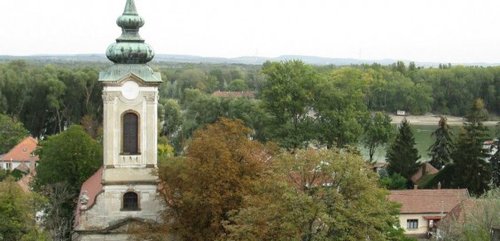Students in Hungary find new worship experiences in international churches
Written by: John Michael LaSalle

Photo courtesy of Kellan Day
Before studying abroad in Hungary, many students envisioned themselves being immersed in local religious culture. However, upon arrival in Budapest, many students did not find this a feasible option.
They attended international churches instead, for a simple reason: they could not learn Hungarian before the trip. Therefore, their church experience was shaped by English language churches — an experience that, although different than expected, impacted many students' present views on church.
According to the U.S. embassy in Budapest, there are 13 churches with services in English, representing most major divisions within Christianity, as well as two synagogues.
Hungary is a predominantly secular country. Only 21 percent of adults claim to attend religious services weekly according to the World Values Survey. Despite this, many still identify with a religious denomination. Just less than 40 percent identified as Catholic in the 2011 census.
The Reformed and Lutheran churches comprise 14 percent, and 18 percent identified as secular.
Sarah Sherman, a recent Calvin graduate, reflected this reality.
"Honestly, most of the Christians I met in Hungary were internationals," Sherman said.
Katie Barkley, another recent graduate says there was a strong sense of community among the Hungarian Christians she did meet.
"They all knew each other well and cared for one another."
One church popular with Calvin students is St. Columba's Scottish Presbyterian Church. Senior Kellan Day characterized it as "incredibly diverse."
"[This was] one of the main reasons I was drawn to it," Day said. "In one service, there would be people from Hungary, Iraq, the United States, Ireland, Scotland, the Congo, the Netherlands and Germany."
A consistent theme in student reflections was is the sense of unity provided by international churches. Erin Smith described her experience at Sacred Heart, a Catholic Church in Budapest.
"It was different because people came from all different countries. Also, it was the only English-speaking Catholic church in Budapest, so all of Budapest's English-speaking Catholics were there. There were no divisions between parishes."
Even among the more fragmented protestants, others were able to find a more domestic experience. Barkley attended a bilingual service at Golgota, Budapest, which is affiliated with the Calvary Chapel fellowship of churches. Golgota had a predominantly Hungarian congregation, and she said this made communication challenging.
"Though some of them spoke English," Barkley said, "I don't think they knew I only spoke English and couldn't converse with them in Hungarian."
She characterized the Hungarians in the congregation as having a strong sense of community, and despite the communication barriers, she was impacted by being accepted into a predominantly Hungarian church.
"I gained a greater understanding and appreciation for diversity within a church," Barkley said. "I also learned more about welcoming, appreciating and embracing those with cultural differences within the church."
Sherman emphasized that her time in Hungary was formative and left lasting changes.
"My time in Hungary changed my whole notion and thought process about the church," she said. "I came home ready to explore different churches in Grand Rapids instead of continuing to attend the one I had begun to feel too comfortable in."
Day also agreed that her time in Hungary shaped her reflections on church.
"Ever since attending St. Columba's, I decided that I needed to attend a higher liturgical service; I now attend Grace Episcopal (in Grand Rapids) as a direct result of my experience in Hungary. It was in Hungary, also, that I realized how I was incredibly thankful for the catholicity and universality of the church, seen most evidently in the liturgical calendar and lectionary."
A strong sense of nostalgia was evident in Smith's reflection on Hungary's impact.
"Honestly, I liked that church better than the church I go to here. Also, after having to take over an hour of public transport to get to church in the morning, I am much more committed to getting to church each week!"
Sherman said that her church experience in Hungary has formed her experience at her present church.
"I've since become part of a much different congregation in Grand Rapids," Sherman said, "one where I have had conversations with my pastor and where I see the church reaching directly into its immediate community. It doesn't look a whole lot like St. Columba's, but I feel like I got there through my experience of church in Hungary."